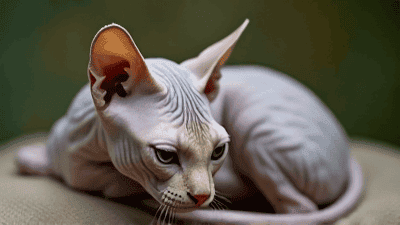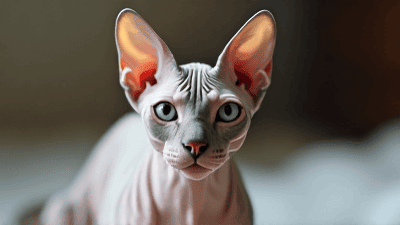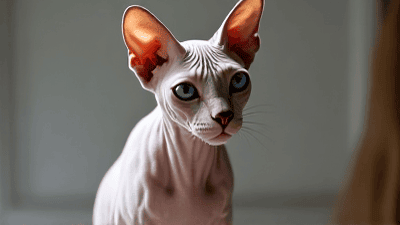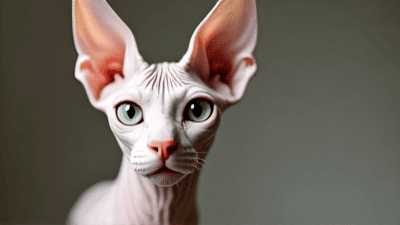
The Sphinx cat, with its striking hairless appearance, has captured the hearts of cat enthusiasts worldwide. Known for their wrinkled skin, large ears, and expressive eyes, Sphinx cats are truly one of a kind. However, their unique appearance comes with specific care requirements that set them apart from other feline breeds.
The Sphinx cat, also known as the Canadian Sphinx, originated in the 1960s in Toronto, Canada. The breed’s foundation can be traced back to a hairless kitten named Prune, born to a domestic cat. Breeders began selectively breeding hairless cats to establish the Sphinx breed as we know it today.
The Sphinx cat was officially recognized by cat registries in the 1980s and has since gained popularity for its unique appearance and affectionate nature. Despite their name, Sphinx cats are not from Egypt but are named for their resemblance to ancient Egyptian statues.

The most distinguishing feature of the Sphinx cat is its lack of fur. While they are often described as completely hairless, some Sphinx cats have a fine layer of peach fuzz on their skin. Their skin can come in a variety of colors and patterns, much like the fur of other cats.
Sphinx cats have soft, warm skin that is prone to wrinkles, especially around the face, legs, and neck. These wrinkles give them a unique and endearing appearance.
Sphinx cats are known for their large, bat-like ears and wide, lemon-shaped eyes. Their ears are highly expressive and can swivel to catch sounds, while their eyes come in a range of colors.
Sphinx cats have a muscular, medium-sized body with a broad chest and a long, whip-like tail. Despite their lack of fur, they are surprisingly heavy for their size due to their dense muscle mass.
Sphinx cats are highly social and thrive on human interaction. They are known for their affectionate nature and often form strong bonds with their owners. Sphinx cats enjoy being the center of attention and will seek out companionship.
These cats are playful and energetic, often engaging in games and activities that keep them entertained. They are curious by nature and enjoy exploring their environment.
Sphinx cats are known for their vocalizations and will often “talk” to their owners to express their needs or desires. They are also highly communicative through body language and facial expressions.

Unlike other cats, Sphinx cats require regular baths to remove oil buildup on their skin. Without fur to absorb the oil, it can accumulate and cause skin issues. Bathe your Sphinx cat every 1-2 weeks using a gentle, hypoallergenic shampoo.
The wrinkles on a Sphinx cat’s skin can trap dirt and oil, so it’s important to clean them regularly. Use a damp cloth or baby wipe to gently clean between the folds, taking care not to irritate the skin.
Sphinx cats are prone to earwax buildup due to their large ears. Clean their ears weekly with a vet-approved ear-cleaning solution to prevent infections.
Sphinx cats may require occasional moisturizing to prevent dry skin. Use a pet-safe moisturizer or coconut oil to keep their skin soft and hydrated.
Because they lack fur, Sphinx cats are more susceptible to sunburn. Limit their exposure to direct sunlight and use pet-safe sunscreen if they spend time outdoors.
Regular nail trimming is essential for Sphinx cats to prevent overgrowth and scratching. Trim their nails every 2-3 weeks using a cat nail clipper.
Sphinx cats have a high metabolism due to their lack of fur, which makes it harder for them to retain body heat. They require a calorie-rich diet to maintain their energy levels.
A diet high in quality protein is essential for Sphinx cats to support their muscle mass and overall health. Look for cat foods with real meat as the primary ingredient.
Ensure your Sphinx cat has access to fresh water at all times. Some Sphinx cats enjoy running water, so consider investing in a cat water fountain to encourage them to drink more.
Because Sphinx cats are prone to weight gain, it’s important to monitor their diet and ensure they get enough exercise. Avoid overfeeding and provide portion-controlled meals.

Schedule annual vet checkups to monitor your Sphinx cat’s health and catch any potential issues early. Keep up with vaccinations, parasite prevention, and dental care.
Sphinx cats are best kept indoors to protect them from extreme temperatures, sunburn, and other outdoor hazards. Provide plenty of enrichment, such as toys, scratching posts, and climbing structures.
Because they lack fur, Sphinx cats are sensitive to cold temperatures. Keep your home warm and provide cozy blankets or heated beds for your cat to snuggle in.
Sphinx cats thrive on social interaction, so make time to play with and cuddle your cat daily. They also do well in multi-pet households, as long as they are properly introduced.
Fact: While Sphinx cats produce less dander than other breeds, they are not completely hypoallergenic. People with severe cat allergies may still react to their saliva or skin oils.
Fact: While Sphinx cats have specific grooming needs, they are not significantly more high-maintenance than other breeds. Regular baths and skin care are manageable with a consistent routine.
Fact: While Sphinx cats may feel cooler to the touch, they can regulate their body temperature effectively. They enjoy warmth but are not constantly cold.
If you’re interested in adopting a Sphinx cat, research reputable breeders who prioritize health and ethical breeding practices. Ask for health certifications and visit the breeder’s facility.
Check local shelters and rescue organizations for Sphinx cats in need of a home. Adoption is a rewarding way to provide a loving home to a cat in need.
Before bringing home a Sphinx cat, ensure your home is safe and comfortable. Stock up on essential supplies, such as a litter box, food, grooming tools, and cozy bedding.
The Sphinx cat is a unique and captivating breed that requires special care to thrive. From their hairless appearance to their affectionate personality, these cats are truly one of a kind. By understanding their specific needs and providing a loving, attentive environment, you can ensure your Sphinx cat lives a happy and healthy life. Whether you’re drawn to their striking looks or their playful nature, a Sphinx cat can make a wonderful addition to your family.